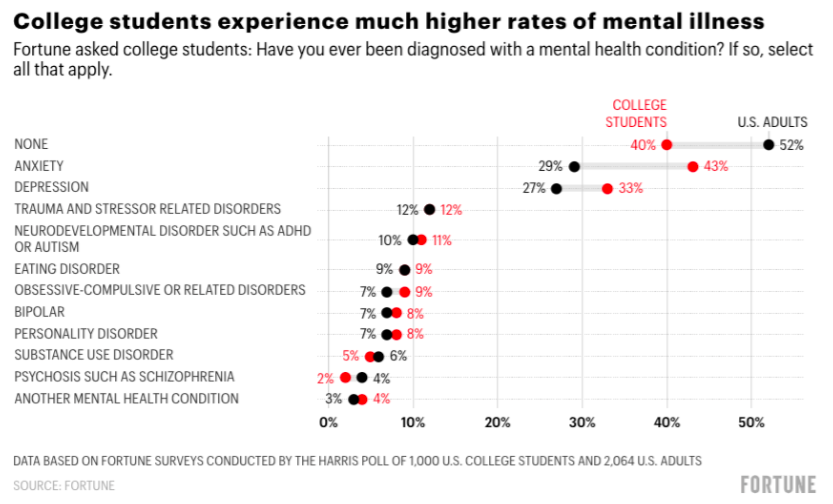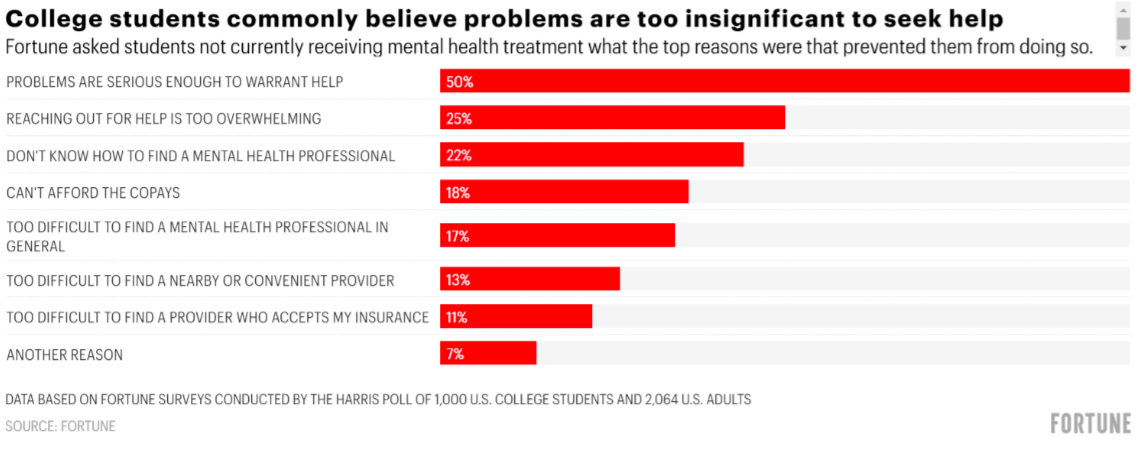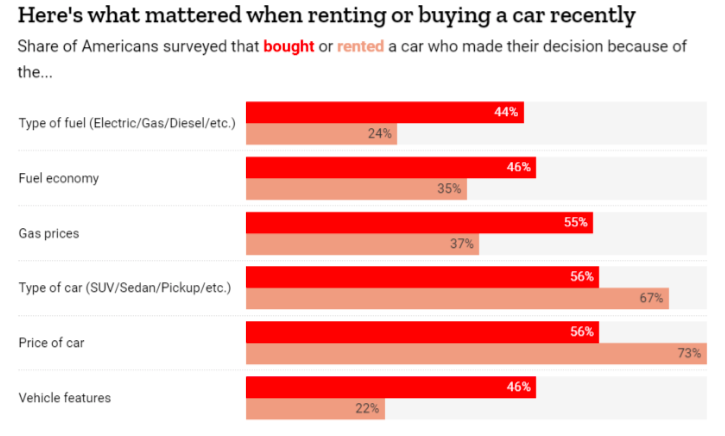Brief • 5 min Read
In The Harris Poll Tracker (Week 124) fielded July 8th to 10th, 2022 among 1,994 U.S. adults, we find that three-quarters of Americans are concerned about affording their living expenses and half are worried about losing their job (+8%-pts, +5%-pts from mid-June). Further, (39%) are concerned about dying if they catch COVID-19 (+5%-pt from last week) in response to widening reports of a new and possibly more transmissible BA.5 strain of the Omnicron Variant.
In our first story with Fortune, we examine mental health issues on America’s college campuses, and then with TIME, we study the effect that rising gas prices have on car buying. In a new Sports Illustrated Harris Poll, we delve into The Golf War between the PGA and upstart LIV league. Lastly, are you watching your steps? Health wearables are exploding in popularity in a new survey from our Harris Poll Brand Platform.
Check out our America This Week: From The Harris Poll podcast on Spotify and Apple Podcasts for data-driven discussions between our CEO John Gerzema and CSO Libby Rodney on this week’s data and more.
As a public service, our team has curated key insights to help leaders navigate COVID-19. Full survey results, tables, and weekly summaries can be accessed for free at The Harris Poll COVID-19 Portal. We will continue to actively field on a regular cadence to track the shifts in sentiment and behaviors as the news and guidelines evolve.
Where Are College Rankings For Mental Health Services? Fortune-Harris Poll
We’ve studied mental health in our country extensively. But this new data is especially concerning: In our latest research with Fortune, six in ten (60%) of college students are living with mental health issues and most schools are unprepared to address it, leaving students facing dire consequences.

- The compounding factors: Among students who have received counseling, less than a third report using mental health services provided by their college or university – in fact (58%) of students reported being put on a waitlist at their college’s counseling services.
- College tours should include the wellness center: Just over a quarter (28%) of students strongly agree that they know where to go on campus to receive mental health treatment.
- What’s worse, many students don’t feel their problems warrant the need for help:

Takeaway: Universities should be touting their culture of wellness the same way they do inclusivity. Despite the high prevalence of mental health problems among college students, counseling services are rarely featured prominently in university brochures, let alone in nationwide rankings, leaving students unprepared in knowing which universities would be able to support both their academic careers and mental health. And even as Gen Z are the most open to speaking about mental health in our surveying, they feel their problems don’t merit university attention – a stigma educators need to attack.
Gas Prices Strike Again, Leaving Americans Hesitant To Purchase New Cars: TIME-Harris Poll
According to our latest poll with TIME, high gas prices are discouraging Americans from buying cars right now.
- Only (10%) of respondents bought a new car in the past six months and many cite gas prices as the main deterrent: (47%) said high gas prices were a big reason why – compared to only a third (37%) of those citing environmental concerns.
- New car owners considered gas prices as much as the cost of the car when making their decision: For those who purchased a car in the past six months, gas prices were pretty much equal in consideration to car price and type (55% vs 56% respectively), in addition (46%) said fuel economy mattered as well as (44%) type of fuel.

- Meanwhile, those renting a car are being less frugal: When it comes to car rentals, consumers are least likely to consider the type of fuel (24%), fuel economy (35%), and gas prices (37%) than they are to consider the type of car (67%) and the price of the car (73%).
Takeaway: It remains to be seen if Americans will wean themselves off SUVs and pickups and return to the compact car craze of the 70s when there were long lines for gas. But this data shows the ‘knock-on effect’ in other categories that higher energy prices bring. Yet while high gas prices might be suppressing new car purchases, it isn’t completely getting Americans off the roads: Enterprise Holdings found that two-thirds of their customers planned to go on road trips this year, albeit for (59%), just smaller ones closer to home.
The Golf War – LIV Tees Off Stateside: Sports Illustrated-Harris Poll
Golf’s civil war has arrived in the United States as the LIV Golf series made its American debut as detailed by Harris Poll CEO (and avid golfer) Will Johnson in Sports Illustrated. We found the upstart league is gaining traction –– especially among younger golf enthusiasts.
- Nearly three-quarters (74%) of golf fans and over half (55%) of Americans aware of LIV Golf have plans to watch at least one event this year – with two-thirds of golf fans having already tuned in.
- Younger Americans are more aware of, more interested in, and more open to the LIV tour — and the split is sharp as 7 in 10 (71%) aged 18 to 34 familiar with LIV plan to watch an event (v. gen pop: 55%).
- Not without controversy: The generational divide is even starker on its Saudi funding as a majority (52%) of those 45 and younger are OK with the arrangement, while those aged 55 and older report far more frequently that they disapprove.
Takeaway: The new Saudi LIV league has grabbed its share of young professional golfers –– Eugenio Chacarra, who was the world’s No. 2 amateur golfer, and James Piot, the 2021 U.S. Amateur champion who both joined LIV recently. And younger consumers seem to not care that critics have derided LIV as sportswashing, where a disreputable regime tries to rehabilitate its reputation through sport. Given how ethically-driven Gen Z are, one wonders if a backlash is coming as awareness of LIV grows?
Pedometers Are So 2002, Hello Health Wearables
Back in February our CVS Health-Harris Poll National Health Project, as covered by Axios, found that Americans were reconnecting with their health, so what does that mean about health wearables?
- Back in February, Americans reported a desire to stay more active, prioritize their health habits, and buy products to boost their health (47%, 43%, 35%).
- Partly because according to our 2021 Stress in America report with the APA, overall health took a back seat during the pandemic: (47%) delayed or canceled health care services, (42%) reported undesired weight gain, and (23%) were drinking more to cope with stress.
- Health wearables are key for many consumers: In our latest report, we also found that Americans would like to monitor their physical activity (55%), blood pressure (48%), and sleep (37%).
- And according to our latest Harris Brand Platform data, health goals are converting into purchases as Fitbit’s brand equity score peaked at 60.6 in July 2021 following new product releases, and experienced the greatest spike in perceiving product quality (+12.0) and brand momentum (+5.6).
Takeaway: Americans are increasingly reliant on data to make decisions about their personal health, and companies like Fitbit have recognized and responded to this enthusiasm by continuing to develop and expand upon their range of trackable metrics. Other brands might understand how to build engagement by creating feedback loops, gamification, and other means of building a coaching-mentoring-encourager relationship as it seems consumers crave positive, tangible affirmation.
Subscribe for more Insights
Subscribe to our newsletter for the latest trends in business, politics, culture, and more.
Download the Data
This survey was conducted online within the U.S. by The Harris Poll from July 8th to 10th, among a nationally representative sample of 1,994 U.S. adults.
Download
Subscribe for more Insights
Subscribe to our newsletter for the latest trends in business, politics, culture, and more.
Download the Data
This survey was conducted online within the U.S. by The Harris Poll from July 8th to 10th, among a nationally representative sample of 1,994 U.S. adults.
DownloadRelated Content







